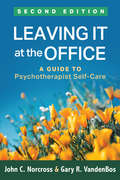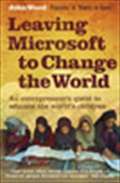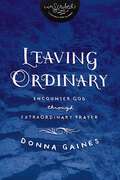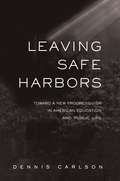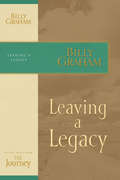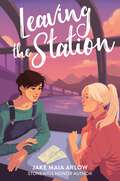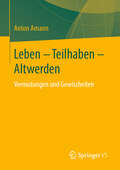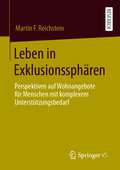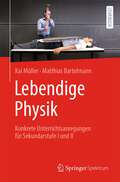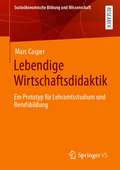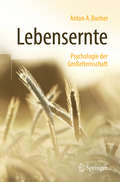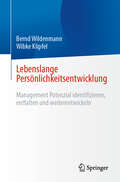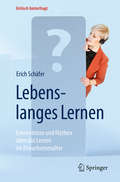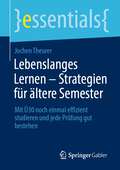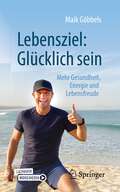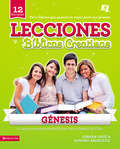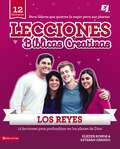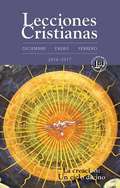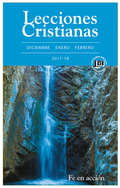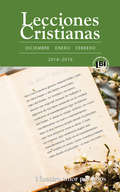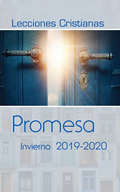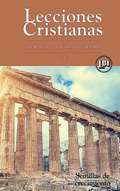- Table View
- List View
Leaving Home (Sweet Valley High #38)
by Francine Pascal Kate WilliamJessica is trying to stop Elizabeth from going to Switzerland for boarding school, because she's worried she'll lose her best friend. Meanwhile, Elizabeth is worried that Jeffrey and Enid are getting a little too close as they work together to make a scrapbook for her.
Leaving It at the Office, Second Edition: A Guide to Psychotherapist Self-Care
by John C. Norcross Gary R. VandenBosMental health professionals provide better care to their clients when they care for themselves. This highly practical guide--now revised and expanded with even more self-care strategies--has helped thousands of busy psychotherapists balance their personal and professional lives. The book presents 13 research-informed self-care strategies and offers concrete methods for integrating them into daily life. Featuring examples and insights from master therapists, every chapter concludes with a self-care checklist. Infused with a positive message of self-renewal and growth, the book shows clinicians how to leave distress at the office and tend actively to their physical, emotional, and spiritual needs. New to This Edition *Chapter on mindfulness and self-compassion. *Increased emphasis on simple, real-time self-care activities. *New examples from additional master therapists and hundreds of workshop participants. *Up-to-date research findings on therapist stress and resilience. *Discussions of competence constellations, building on self-care strengths, moral stress, deliberate practice, presession preparation, journaling, and multiculturalism.
Leaving Microsoft to Change the World: An Entrepeneur's Odyssey to Educate the World's Children
by John E. WoodsA trip to Nepal convinced Wood to divert the energy he was devoting to Microsoft into a cause that needed addressing - educating all children
Leaving Ordinary: Encounter God Through Extraordinary Prayer (InScribed Collection)
by Donna Gaines InScribedHow to develop an intimate relationship with God through prayer. The deepest longing of the human heart is to know and be known by God. God longs for an intimate relationship with us as well. But how do we develop that kind of relationship with a holy God? It is one thing to long for such a relationship, but quite another to experience intimacy with Him. In Leaving Ordinary, Donna Gaines shares from her personal experience how prayer can become the channel that links the believer&’s heart to the heart of God.God gave the pattern of the tabernacle to the Israelites. It was a temporary and portable dwelling for His glory. Through it God taught them how to approach and worship Him before He led them to their reward—the promised land. Using the tabernacle and its articles as a guide, Donna teaches readers how to interact with God in that secret place of true intimacy that leads to worship. Your ordinary daily practice of prayer can become an extraordinary encounter with the living Lord. Leaving Ordinary is essential reading for anyone who desires to enter into and experience the reality of God&’s presence.As you read, you will:Explore the tabernacle and discover how it can be a guide for prayer today.Learn how to gain a stronger, more intimate relationship with God.Develop your own personal prayer testimony as you experience His presence.
Leaving Safe Harbors: Toward a New Progressivism in American Education and Public Life
by Dennis CarlsonTo rise to the challenges of postmodern culture, Carlson argues, progressives will need to leave the safe harbors of what is familiar and comfortable. A new progressivism can only be forged of a fundamental re-thinking and re-mythologizing of democratic education. Drawing upon cultural studies perspectives, Carlson interrogates philosophy through p
Leaving Well Activity Book: Therapeutic Activities to Support Kids Aged 6-12 who are Moving to a New Country (Moving On)
by Claire HolmesMoving from country to country is no small feat. This activity book is designed for use with children aged 6-12 to help those on the move to navigate the process of global transition smoothly. Based on the latest relocation and transition research, wellbeing boosting strategies are shared for transition and beyond. Children are introduced to mindful activities and are encouraged to use their creativity by annotating and illustrating the pages as they move through the book, allowing them to be an active participant in their move. Leaving Well Activity Book helps children to reflect on how they feel about the move, to remember other moves and understand that change is a part of life. Full of valuable strategies to boost wellbeing as they move forward, the text highlights top tips for expressing feelings that will help children prepare for departure. The book normalises mixed feelings, helping the child acknowledge their hopes and fears, and reflect on their sense of control. This book can be used effectively alongside: Arriving Well Activity Book which helps the child settle in their new place, to reflect on the move and understand that change is a part of life. Moving On Facilitator’s Guide which offers guidance notes and prompts to help bring out the best experience for the child and is designed to help the adult feel confident in their delivery and in responding to any questions. It contains key points to consider, examples of ‘what you could say’, as well as explains the theory behind the workbook activities. Acting as a tool for engagement, Leaving Well Activity Book will help children come to terms with the move and help adults support children preparing to leave for a new country.
Leaving a Legacy: The Journey Study Series
by Billy Graham"You will only make this journey once. What kind of journey will it be?" The Christian Life is a marathon, not a sprint. Finishing strong requires a commitment to a journey that continues throughout our lives. How we handle the stresses of the journey is important, but evenmore vital is how we finish the journey-and the spirtiual impact our journey has on these around us. How can Christians become spirirtually stronger with each passing decade? The significant events in life's journey offer the chance to make an impact in the lives of those you love and throughout the wolrd. Leaving a Legacy explains how to let God lead you and others on the journey home. The Journey Study Series is based on Billy Graham's best-selling book The Journey, the culmination of a lifetime of spiritual insight and ministry experience. Each chapter explores the joys, triumphs, and conflicts we all encounter on our journey through life.Use for self-study or shared experience in small groupssix weeks of lessonssidebars offer a scriptural journey through God's wordquestions for starting group discussionsInsight-filled scripture passages to studyEach chapter includes thought-provoking questions, commentary, scriptures, and insights to help you on life's journey. Each lesson teaches the secret of walking with God on life's path. Understanding God's truths will make life's journey easier and let Him fulfill His promise to lead you home.
Leaving the Station
by Jake Maia ArlowNina LaCour meets Alyson Derrick in this cross-country journey of identity, love, and friendships as Zoe tries to figure out her life, one train stop at a time.Zoe’s life has gone off the rails.When she left Seattle to go to college in New York, she was determined to start fresh, to figure out what being a lesbian meant to her, to experiment with clothes and presentation away from home for the first time. Instead, she lost touch with her freshman orientation friend group, skipped classes, and failed completely at being the studious premed student her parents wanted her to be. But the biggest derailment of all? Her newly minted ex-boyfriend—and the fact that she had a boyfriend to begin with. When she met Alden, he made her feel wanted, he made her feel free. He made her feel . . . like she could be like him, which was exciting and confusing all at once.So, Zoe decides a second fresh start is in order: She’s going to take a cross-country train from New York to Seattle for fall break. There, no one will know who she is, and she can outrun her mistakes.Or so she thinks until she meets Oakley, who’s the opposite of Zoe in so many ways: effortlessly cool and hot, smart, self-assured. But as Zoe and Oakley make their way across the country, Zoe realizes that Oakley’s life has also gone off the rails—and that they might just be able to help each other along before that train finally leaves the station.
Leben - Teilhaben - Altwerden: Vermutungen und Gewissheiten
by Anton AmannLeben muss als Ergebnis der Evolution aufgefasst werden und menschliches Leben als die Entstehung der Art Sapiens aus der Gattung des Homo aus der Familie der Menschenaffen. Wird die Entstehung menschlichen Lebens als evolutionäre Tatsache mit der Vorstellung sozialen Lebens gekoppelt, werden wir auf die konstruktive Hervorbringung der menschlichen Lebensformen verwiesen, deren integraler Bestandteil gesellschaflichte Teilhabe ist. Teilhabe ist einerseits an die Phylogenese der Art Sapiens rückgebunden, muss andererseits aber von jedem Menschen in der Ontogenese neu erworben und praktiziert werden, wobei er auf Umwelt angewiesen ist. Teilhabe im Alter ist eine eigene Spezifikation der Bedingungen dieses Prozesses und lässt sich anhand einer Vielzahl von empirischen Befunden darstellen.
Leben in Exklusionssphären: Perspektiven auf Wohnangebote für Menschen mit komplexem Unterstützungsbedarf
by Martin F. ReichsteinIm Bereich wohnbezogener Hilfen für Menschen mit sogenannter geistiger Behinderung treten systemisch und systematisch ,Exklusionssphären‘ in Form von hochspezialisierten Angeboten sowie ,Resteinrichtungen‘ auf. Hiervon sind aktuell Menschen mit komplexen Unterstützungsbedarfen besonders betroffen. Der Autor untersucht am Beispiel von Menschen mit sogenannter geistiger Behinderung und herausforderndem Verhalten, schwerer bzw. mehrfacher Beeinträchtigung sowie fortgeschrittenem bzw. hohem Lebensalter explorativ das Entstehen von ,Exklusionssphären‘ sowie deren Auswirkungen auf die individuelle Lebensqualität und die persönlichen Sozialräume betroffener Personen.
Lebendige Physik: Konkrete Unterrichtsanregungen für Sekundarstufe I und II
by Matthias Bartelmann Kai MüllerMit diesem Buch gestalten Sie lebendigen Physikunterricht: Die Autoren präsentieren konkrete praxiserprobte Anregungen und Beispiele für Ihren Physikunterricht in der Sekundarstufe I und II. Mit dem Kapitel „Physikalisch Denken“ beginnt das Buch und schließt mit physikalischen Schmankerln – dazu gehören sowohl Ideen unter dem Titel „Die andere Physikstunde“ als auch Bausteine zu verschiedenen Themen, die stundenübergreifend verwendet werden können. Jedes Kapitel des Hauptteils beginnt mit einem fachlichen Abriss „Die Physik darunter“, der den fachlichen Hintergrund zum zugehörigen Gebiet auf Universitätsniveau pragmatisch darstellt. Anschließend wird jeweils mindestens eine aufbereitete Unterrichtsstunde beschrieben – angefangen von Motivationsbeispielen („Wo begegnet uns das Phänomen?“) über Schüleraktivitäten, Experimente, Einführung physikalischer Prinzipien bis hin zur Formulierung von Kernaussagen. Jede beschriebene Physikstunde wird durch Einordnungen und Anmerkungen für die Lehrkraft ergänzt. Dieses Praxisbuch wendet sich an Lehramtsstudierende, Referendarinnen/Referendare und Lehrkräfte. Sie finden hier Beispiele aus der Mittel- und Oberstufe zu den Themen Mechanik, Akustik, Optik, Elektrizität und Elektrodynamik, Thermodynamik, Struktur der Materie, Spezielle Relativitätstheorie und Quantenphysik.
Lebendige Wirtschaftsdidaktik: Ein Prototyp für Lehramtsstudium und Berufsbildung (Sozioökonomische Bildung und Wissenschaft)
by Marc CasperWoran liegt es, wenn sich Wirtschaft tot(-langweilig) anfühlt? Wie kann Wirtschaft für Lernende „lebendig“ werden? Mehr als eine Metapher, so lässt sich die Idee des „Lebendigen Lernens“ nach Cohn für didaktische Analyse und Gestaltung ausdifferenzieren. Diese Arbeit erschließt dazu Konzepte der Kritischen Theorie und der Humanistischen Psychologie für die Wirtschaftsdidaktik. Exemplarisch steht eine universitäre Lehrveranstaltung im Lehramt an Beruflichen Schulen im Mittelpunkt, aus der im Modus gestaltungsorientierter Forschung die hier vorgestellten Gestaltungskriterien gewonnen wurden.
Lebensernte: Psychologie der Großelternschaft
by Anton A. BucherIn diesem Buch können sich alle, die in ihre Enkel vernarrt sind, informieren, warum sie damit sehr richtig liegen. Ein Streifzug durch Geschichte und Literatur wird fundiert durch Aspekte der Familienforschung und die soziologische Betrachtung einer neuen Rolle der Großeltern. Heute haben Großeltern nicht mehr nur eine Funktion für die Kleinen, sondern begleiten über die Lebensspanne. In einer Zeit, in der man den Eindruck bekommt, jeder Zweite würde das Alter als Last empfinden oder jeder Vierte lebe in Zwist und Trennung, lädt der Autor ein, die Etappe als Oma und Opa als Ressource für ein gelungenes Leben zwischen Individuation und Bezogenheit zu entdecken – für sich selbst wie für die Enkel. Die Sicht der Enkel rundet das Lesebuch ab. Aus dem Inhalt: Großeltern in Literatur und Geschichte – Nicht nur Märchen erzählen, sondern joggen gehen – Ernte der Beziehung – Die Sicht der Enkel. Über den Autor: Prof. Dr. Anton A. Bucher widmet sich neben seinen universitären Studien gern psychologischen Aspekten des guten Lebens und ist Autor mehrerer erfolgreicher Bücher.
Lebenslange Persönlichkeitsentwicklung: Management Potenzial identifizieren, entfalten und weiterentwickeln
by Bernd Wildenmann Wibke KlipfelDieses Buch unterstützt Sie dabei, den eigenen Stand der Persönlichkeitsreifung zu ermitteln und weiterzuentwickeln. Dies wird Ihnen auch in der Führung und Begleitung anderer Menschen weiterhelfen. Aus der Erkenntnis der lebenslangen Entwicklung der Persönlichkeit, ergeben sich im Laufe des Lebens in den verschiedenen Reifungsstufen viele Möglichkeiten der Entfaltung. Das Buch zeigt auf, dass zwar nicht alles zu jedem Zeitpunkt, aber zu jedem Zeitpunkt etwas entwickelbar ist. Anhand eines leicht verständlich dargestellten Modells erfahren Sie, welche Reifestufen wir Menschen erreichen können und welche persönlichen Entwicklungen über das Leben hinweg möglich sind. Dabei wird das übliche horizontale Einschätzungsverfahren mit Kompetenzen, Haltungen, Motiven und Emotionen durch eine vertikale, neue und spannende Perspektive ergänzt. Sie erhalten Entwicklungstipps für die unterschiedlichen Entwicklungsstufen und Entwicklungsfelder. Die Autoren vermitteln dabei positive Entwicklungsmöglichkeiten in nahezu allen Feldern und regen damit einen Paradigmenwechsel der Persönlichkeitsbetrachtung an.
Lebenslanges Lernen
by Erich SchäferIn diesem Buch finden Sie Antworten darauf, wie Sie als Erwachsener gut, erfolgreich und mit Freude lebendig und nachhaltig lernen können. Sie erfahren, welche Mythen über das Lernen im Erwachsenenalter existieren und welche Lerntechniken und -tools für Sie hilfreich sein können. Dieses Werk zeigt Ihnen, wie Sie sich einen Überblick über den Markt der Weiterbildungsangebote verschaffen und anhand welcher Kriterien Sie deren Qualität beurteilen können. Es werden Wege beschrieben, wie Sie In-Beziehung-gehen zu sich, dem Lerngegenstand und dem Kontext und was Sie über Lernsettings- und Lernarrangements wissen sollten. Die neuesten Erkenntnisse der Neurobiologie und Lernpsychologie zeigen, dass Lernen keine Frage des Alters ist, sondern der eigenen Begeisterungsfähigkeit. Lebenslang zu lernen ist nicht nur möglich, sondern es kann uns auch gesünder, glücklicher und selbstbewusster machen. Das Buch bietet einen Leitfaden durch den Dschungel der eigenen Weiterbildung und hilft allen Weiterbildungsinteressierten sowohl im Vorfeld, während als auch am Ende der eigenen Fort- und Weiterbildung, den eigenen Lernprozess kritisch zu begleiten.
Lebenslanges Lernen – Strategien für ältere Semester: Mit Ü30 noch einmal effizient studieren und jede Prüfung gut bestehen (essentials)
by Jochen TheurerLebenslanges Lernen wird immer wichtiger. Doch mit über 30 Jahren nochmal zurück an die Uni? In diesem essential zeigt Jochen Theurer am eigenen Beispiel, wie man im fortgeschrittenen Lebensalter auch mit familiären und beruflichen Bindungen erfolgreich und gelassen ein zweites Mal studiert. Denn dafür ist es nie zu spät. Und mit Ü30 verfügen Sie über Ressourcen, von denen mancher frischgebackene Abiturient nur träumen kann.
Lebensziel: Mehr Gesundheit, Energie und Lebensfreude
by Maik GöbbelsViele fundierte Impulse für Ihr persönliches Glück – trainieren Sie Ihre Körperchemie auf gute Energie! Der erfahrene Sport- und Mentaltrainer Maik Göbbels erklärt, welche individuellen Anreize aus Ernährung, Bewegung und sozialem Umfeld das persönliche Muster eines Menschen für Gesundheit, Zufriedenheit und Erfolg triggern. Verständnisvoll und motivierend erhält der Leser konkrete Hinweise auf den eigenen Status quo und erfährt, wie er dank der Kraftwerke im eigenen Körper, der Mitochondrien, neue Energien gewinnt, die eigene Kraft (wieder) fokussiert, lohnende Änderungen wagt, Resilienz aufbaut und vor allem seine volle Lebensfreude wiederfindet.
Lecciones Bíblicas Creativas: Génesis
by Germán Ortiz Howard AndruejolDoce lecciones listas para usarse en grupos juveniles que son perfectas para grupos de escuela dominical, reuniones juveniles o ministerios de grupos pequeños. Las lecciones están diseñadas para estimular el aprendizaje y contienen ilustraciones y diagramas para hacer el aprendizaje más efectivo. Tienen un enfoque totalmente contemporáneo y adecuado a la juventud del nuevo siglo. Usan lecciones interactivas, dramatizaciones, diálogo y discusiones. No hay productos semejantes en el mercado.
Lecciones Bíblicas Creativas: Los Reyes (Especialidades Juveniles / Lecciones bíblicas creativas)
by Esteban Obando Eliezer RondaDoce lecciones listas para usarse en grupos juveniles. Son perfectas para grupos de Escuela Dominical, reuniones juveniles o ministerios de grupos pequeños. Las lecciones están diseñadas para estimular el aprendizaje. Contienen varias ilustraciones y diagramas. Tienen un enfoque totalmente contemporáneo y adecuado a la juventud del nuevo siglo. Usan lecciones interactivas y participativas, dramatizaciones, diálogo y discusiones. No hay productos semejantes en el mercado.
Lecciones Cristianas libro del alumno trimestre de invierno 2015-2016
by Carmen GaudLecciones Cristianas tiene como propósito ayudar a las personas adultas hispanas a crecer en su comprensión de la Biblia y relación de ésta con la vida. Lecciones Cristianas sigue la serie de las Lecciones Bíblicas Internacionales. Está escrito especialmente para las iglesias de habla hispana. También hay un Libro del Maestro que provee sugerencias importantes para la enseñanza de cada lección, preguntas para discutir y actividades para la clase. Lecciones Cristianas helps Hispanic adults grow in their knowledge of the Bible and how it relates to their lives. Lecciones Cristianas follows the International Lesson Series. The content of this excellent study is biblical and it is written especially for Spanish-speaking churches. The teacher book provides valuable suggestions for teaching the class, discussion questions, and class activities.
Lecciones Cristianas libro del alumno trimestre de invierno 2016-17/Winter 2016-17 Student Book: Un ciclo divino
by Julio GomezLecciones Cristianas tiene como propósito ayudar a las personas adultas hispanas a crecer en su comprensión de la Biblia y relación de ésta con la vida. Lecciones Cristianas sigue la serie de las Lecciones Bíblicas Internacionales. Está escrito especialmente para las iglesias de habla hispana. También hay un Libro del Maestro que provee sugerencias importantes para la enseñanza de cada lección, preguntas para discutir y actividades para la clase. Lecciones Cristianas helps Hispanic adults grow in their knowledge of the Bible and how it relates to their lives. Lecciones Cristianas follows the International Lesson Series. The content of this excellent study is biblical and it is written especially for Spanish-speaking churches. The teacher book provides valuable suggestions for teaching the class, discussion questions, and class activities.
Lecciones Cristianas libro del alumno trimestre de invierno 2017-18: Fe en accion
by Carmen GaudLecciones Cristianas tiene como propósito ayudar a las personas adultas hispanas a crecer en su comprensión de la Biblia y relación de ésta con la vida. Lecciones Cristianas sigue la serie de las Lecciones Bíblicas Internacionales. Está escrito especialmente para las iglesias de habla hispana. También hay un Libro del Maestro que provee sugerencias importantes para la enseñanza de cada lección, preguntas para discutir y actividades para la clase. Lecciones Cristianas helps Hispanic adults grow in their knowledge of the Bible and how it relates to their lives. Lecciones Cristianas follows the International Lesson Series. The content of this excellent study is biblical and it is written especially for Spanish-speaking churches. The teacher book provides valuable suggestions for teaching the class, discussion questions, and class activities.
Lecciones Cristianas libro del alumno trimestre de invierno 2018-19: Nuestro amor por Dios
by Eliezer Valentin-CastanonLecciones Cristianas tiene como propósito ayudar a las personas adultas hispanas a crecer en su comprensión de la Biblia y relación de ésta con la vida. Lecciones Cristianas sigue la serie de las Lecciones Bíblicas Internacionales. Está escrito especialmente para las iglesias de habla hispana. También hay un Libro del Maestro que provee sugerencias importantes para la enseñanza de cada lección, preguntas para discutir y actividades para la clase. Lecciones Cristianas helps Hispanic adults grow in their knowledge of the Bible and how it relates to their lives. Lecciones Cristianas follows the International Lesson Series. The content of this excellent study is biblical and it is written especially for Spanish-speaking churches. The teacher book provides valuable suggestions for teaching the class, discussion questions, and class activities.
Lecciones Cristianas libro del alumno trimestre de invierno 2019-2020: Promesa
by Ediberto Lopez Yolanda Pupo-Ortiz Heiei ArencibiaLecciones Cristianas está escrito especialmente para las clases de adultos de habla hispana. Tiene como propósito ayudar a las personas adultas a crecer en su comprensión de la Biblia y la relación que tiene con la vida. El libro del líder provee sugerencias, preguntas para discutir y actividades importantes que ayudarán a hacer mejor la enseñanza de cada lección. Nuevas lecciones cada trimestre. Lecciones Cristianas helps Hispanic adults grow in their knowledge of the Bible and how it relates to their lives. The content of this excellent quarterly study is written especially for Spanish-speaking churches. The leader guide provides valuable suggestions for teaching the class, discussion questions, and class activities.
Lecciones Cristianas libro del alumno trimestre de otono 2015
by Justo L. GonzalezLecciones Cristianas tiene como propósito ayudar a las personas adultas hispanas a crecer en su comprensión de la Biblia y relación de ésta con la vida. Lecciones Cristianas sigue la serie de las Lecciones Bíblicas Internacionales. Está escrito especialmente para las iglesias de habla hispana. También hay un Libro del Maestro que provee sugerencias importantes para la enseñanza de cada lección, preguntas para discutir y actividades para la clase. Lecciones Cristianas helps Hispanic adults grow in their knowledge of the Bible and how it relates to their lives. Lecciones Cristianas follows the International Lesson Series. The content of this excellent study is biblical and it is written especially for Spanish-speaking churches. The teacher book provides valuable suggestions for teaching the class, discussion questions, and class activities.

